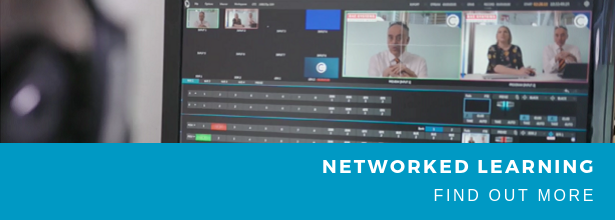Dr Toby Thompson, Networked Learning Director in the Learning Design and Innovation group at Cranfield University, explains how he, along with Cranfield’s engineering and manufacturing experts, delivers an entirely online engineering post-graduate course, the first of its kind in the UK.
Online and On the Job
Earlier this year a cohort of 76 graduate engineers from BAE Systems started the taught component of their apprenticeships at Cranfield University in Bedfordshire, UK. Successful completion of their 18-month Post Graduate Diploma in Engineering Competence will be a key step in securing for them the sought-after chartered engineering status (CEng), boosting their already promising careers in the global defence, aerospace and security company. Nothing unusual there, apart from the fact that the 76 students won’t actually be coming to the Bedfordshire campus, one of the UKs only post-graduate only universities. They’ll either be in their offices spread across the UK, or sat comfortably at home, studying with their peers in live online teaching sessions delivered from Cranfield’s new state-of-the-art online teaching studio.
The pioneering spirit of Cranfield’s technology and management focused post-graduate provision is well matched by our bold move to switch to entirely online delivery for this new course. And this innovative method of delivery is going down a storm in BAE Systems, a company known for its long heritage of innovation.
An online engineering course?
Yes, really. With all of the graduate engineers in full time employment in maritime engineering, air, electronic systems, and land systems, and based at various secure locations around the UK, live online teaching was the ideal medium to meet the skill development challenges facing BAE Systems. Richard Hamer, the director of education and skills at BAE Systems, speaking about this innovative course in The Times newspaper recently, says “the post-graduate diploma in engineering competence will allow our graduate engineers to apply their learning in a work-based context, with the assessment focused on competency rather than academic ability”. In fact, the online method ensures that the content of the programme is constantly placed alongside the realities inside BAE Systems, for maximum application.
The 8 x 4-day online modules of the PG Diploma include design-driven innovation, operations management and general management, among others. Teaching session combine live interactive video sessions with our world-class experts, together with inter-modular interaction on a virtual learning environment.
Convenient collaboration
Ultimately though, student experience is always the most important consideration. Feedback from the graduate engineers reveals they greatly appreciate the convenience and flexibility of studying online. The combination of live interactive and recorded ‘on-demand’ sessions has meant that they can study securely from almost anywhere, often from home, and in ways that suit their work-life balance, which is an important consideration for this millennial group of students Cranfield is fortunate to be working with.
Virtual study doesn’t mean working in isolation however. Using virtual breakout groups has enabled graduates to work for extended periods in small groups of 4s and 5s, which they’ve really enjoyed. As well as learning with their peers from different sectors of the company, these breakout groups have helped Cranfield academics focus the expert input on company issues. Students also keep in contact with each other, and with their lecturers, via live chat and live audio, all facilitated in real-time from the Cranfield studio.
Christian Balan, 24, is one of the first students to start the level 7 apprenticeship. He is an aircraft maintenance and support graduate at the BAE Systems Warton plant in Lancashire. Speaking about the programme recently in The Telegraph newspaper, he said “we started our online sessions with Cranfield University at the start of this year. I thought it would feel overwhelming sitting in front of a computer for hours, but we had lots of interaction with other students and plenty of breaks. The overall programme gives a break from the day-to-day business, allowing you to think about aspects which are normally taken for granted in a fast-paced work environment. Having the freedom of doing these modules at home is another great asset as I can concentrate better”.
Reliable, confidential, secure, and cost-effective
Security, confidentiality and reliability are always top of mind for us. Understandably therefore, using online training technology to run a course on behalf of a prestigious global defence, aerospace and security company such as BAE Systems potentially raises concerns on all three counts. Fortunately, with the technology partner Cranfield is working with, I had no such apprehensions and knew that the virtual study environment would be as secure as it was reliable.
Just as importantly, there are some serious cost-saving benefits to be gained for sponsoring companies moving lecture delivery online. There are no accommodation or travel costs incurred by any of the students, thereby optimising the limited budget set by the UK Government for the apprenticeship levy scheme.
Pioneering spirit
We’re really proud to be playing a part in boosting Britain’s engineering skills and productivity by delivering higher-level apprenticeships in a completely new way. And while nothing will ever completely replace face-to-face teaching, live online teaching does help broaden the scope and accessibility of academic study, making it more readily available to full-time workers. With online learning I know that some people get it, and some people don’t need to get it; but the next generation will take this method of delivery for granted. Preparing apprentices for this exciting future is what makes this innovative course a killer: making our students too fast to follow. I recommend you give it a try.
Read more about Networked Learning
- Power your organisation with these alternatives to the traditional webinar
- Management Development: The future of learning management systems
- Points mean prizes: How gamification drives learning engagement with executive development learning management systems
- Seeing is believing: the role of Virtual Reality in executive education





